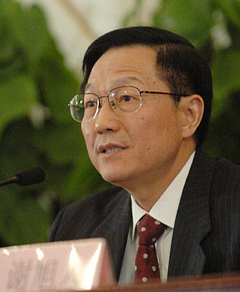China expects new achievements for GMS cooperation
 0 Comment(s)
0 Comment(s) Print
Print E-mail
Xinhua, December 16, 2011
E-mail
Xinhua, December 16, 2011
|
|
China will continue to strengthen ties with the Greater Mekong Subregion (GMS) countries and the Asian Development Bank (ADB) to promote sub-regional cooperation and regional prosperity in the next decade, said Chinese Minister of Finance Xie Xuren in Beijing on Thursday.
Xie made the remarks in an interview prior to the fourth Summit of the Greater Mekong Subregion (GMS)-Economic Cooperation Program, scheduled for Dec. 19 to 20 in Naypyidaw, Myanmar's administrative capital.
Established in 1992, with the assistance of the ADB, the program gathers China, Cambodia, Laos, Myanmar, Thailand and Vietnam, countries sharing the Mekong River. It is designed to enhance economic relations among these countries.
Noting next year is 20th anniversary of GMS cooperation, Xie said China is satisfied with the pragmatic cooperation among GMS member countries in the past two decades and is full of confidence for their future work.
He said the GMS Strategic Framework for 2012-2022, which will be endorsed at the fourth GMS summit, will guide the GMS cooperation to achieve new substantive results.
The new strategic framework proposed eight priority sectors for cooperation: namely, GMS economic corridor development, infrastructure linkages, energy, telecommunications, tourism, agriculture, environment and human resources development, he said.
By the end of 2010, the GMS countries have launched 227 cooperative projects in nine areas -- transport, energy, telecommunications, environment, agriculture, human resources, tourism, trade and investment -- with a total investment of 14 billion U.S. dollars.
The implementation of these projects has greatly pushed forward the social and economic development of the GMS countries, especially in the construction of infrastructure, said Xie.
He said three main transport arteries have been basically completed, including a south-north passage from China's Kunming city to Bangkok in Thailand, an east-west passage from Vietnam to Myanmar via Laos and Cambodia, and a southern passage from Vietnam to Thailand via Laos.
The ADB, as GMS's coordinator, financing bank and technical supporter, has played an important role, he said, adding China and the other GMS countries appreciate ADB's long-term support for the GMS cooperation.
China has always attached great importance to and actively participated in the GMS cooperation, and provided assistance to the best of its ability, he said.
China has participated in and supported the GMS's infrastructure projects, including construction of the Kunming-Bangkok road, improvement of the channel of the upstream of the Mekong River, and the construction of the pan-Asia railway linking Kunming and Singapore, said Xie.
The construction of the GMS Information Highway and the Biodiversity Conservation Corridors, which were initiated by China several years before, have also achieved positive progress, he said.
China also made great efforts to beef up GMS cooperation in trade facilitation, agriculture, cross-border infectious disease prevention and control, and tourism, he added.
According to ADB estimates, at least 18 billion U.S. dollars will be needed in the next decade for the GMS's work.
Xie called on all participants, including the ADB, development partners and all member countries, to increase funding.
As a GMS member country, China donated 20 million U.S. dollars to the ADB to establish the China Fund for Poverty Reduction and Regional Cooperation in 2005.
In May 2011, the Chinese government announced another donation of 20 million U.S. dollars to the ADB to replenish the China Fund.
Within its capacity, China will continue to contribute to sub-regional cooperation and regional prosperity by various means, such as providing funds, said Xie.







Go to Forum >>0 Comment(s)